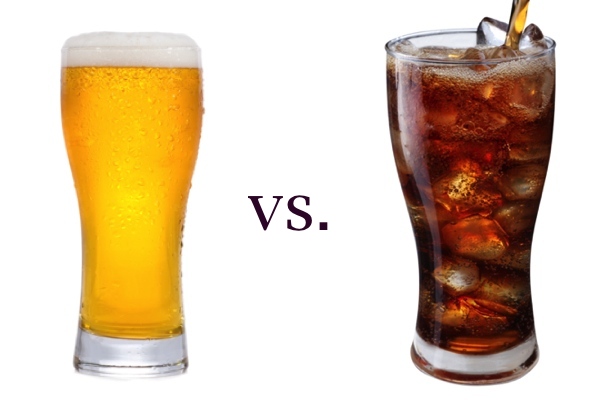For long, there have been campaigns and discussions about the harmful effects and diseases associated with alcohol consumption. In most cases, it is not the alcohol, but the quantity consumed that affects a person. Limited consumption of alcohol can, in fact, work to your advantage. Alcohol, when consumed in moderation, helps to avert, check or improve many medical conditions and health ailments.
Deal with common cold effectively: According to research, the antioxidants present in wine helps to fight common cold better. Limited intake of alcohol, red wine to be precise (~1-2 glasses per day), can, thus, help to reduce the instances of common cold significantly.
Weight loss made easy: Studies conducted by the Oregon State University suggest that certain varieties red wine (the Red Muscadine Wine) can play a pivotal role in weight reduction. The Red Muscadine, a variety of wine grapes used to make red wine contains ellagic acid. It is this ellagic acid that helps to cease or slow down the growth and development of the fat cells. Red wine also helps to manage fatty liver effectively.
Keep cardiovascular diseases at bay: The high-density lipoprotein (HDL), also known as the Good Cholesterol is indeed good for the body. It acts as a shield, keeping the heart hale and hearty. Moderate alcohol consumption helps to elevate the level of HDL. One of the main reasons attributing to heart attacks are the small blood clots that block the arteries of the brain, heart, and neck. Alcohol (limited intake) has been able to put a check in the formation of such blood clots.
Reduced instances of cognitive impairment: Reports suggest that people who consume alcohol within limits are less likely to develop dementia and Alzheimer's disease. Moderate consumption tends to make the brain cells fit and more active, thus, enabling the cells to deal with stress and other related factors.
A little wine for a better libido: Limited consumption of wine is good for a better sexual life. Research indicate that the antioxidants present in wine act as a catalyst, resulting in an improved libido (lowers the incidences of erectile dysfunction in men). A little wine can work wonders for women as well (increasing their sexual desires and feelings).
Enjoy a diabetes-free life: Type 2 Diabetes and the associated ailments and complications can make life miserable. However, people who consume a small quantity of alcohol (preferably 1-2 glasses per day) are at a lower risk of developing diabetes (Type 2). A path-breaking finding indeed!
People with moderate alcohol consumption are also at a lower risk of developing gallstones. The high silicone content in beer helps to strengthen the bones, but only when consumed within limits. Beer is also rich in calcium, magnesium, and vitamins (thiamine, riboflavin).
How much alcohol can you safely drink every day? Moderate, say the experts. Alcohol abuse has serious health downsizes, but moderate drinking can actually be good for your heart. Moderate alcohol use has a few other health benefits too. Let’s see what these are.
Reduces risk of developing and dying from heart disease
Reduces your risk of ischemic stroke during which the arteries to your brain become narrowed or blocked, causing reduction of blood flow to your brain
Reduces your risk of diabetes
The link between alcohol and health is tenuous at best and the health benefits of moderate drinking are by no means certain. Also every one may not benefit from alcohol. Moderate alcohol use - Guidelines
One drink a day is considered moderate for healthy women of any age and men older than 65, and up to two drinks a day for men younger than 65. This alcoholic drink can be:
Beer: 12 ounces
Wine: 5 ounces
Distilled spirits : 1.5 ounces
Moderate alcohol use can be counter-productive for you, if you have risk factors for heart disease. It’s always better to take care to lead a healthy lifestyle and eat a heart-healthy diet to reduce your heart attack risks.
Risks of heavy alcohol use
We know about the definition of moderate drinking, but what’s heavy drinking? It is defined as more than three drinks a day for women and men older than 65 (or more than seven drinks a week), and more than four drinks a day for men less than 65 (or more than 14 drinks a week).
Binge drinking is even worse. If you drink four or more drinks within two hours as a woman and five or more drinks within two hours as a man, it is referred to as binge drinking. Heavy drinking, including binge drinking, can increase your risk of serious health problems, like:
Cancer, including breast cancer and cancers of the mouth, throat and esophagus
Pancreatitis or inflammation of the pancreas
Sudden death due to pre-existing cardiovascular disease
Alcoholic myopathy or damage to heart muscle, which causes heart failure
Stroke
High blood pressure
Liver disease
Brain damage in fetuses
It’s best to ditch alcohol altogether. It is the healthiest thing you could ever do. The guidelines make it very clear that you shouldn’t start drinking alcohol, albeit moderately, to make your heart healthy. The best way to have a healthy heart is to eat and exercise right. However, if you are an occasional drinker, you could make sure that your alcohol intake is within limits and you drink moderately at all times so that you don’t attract any health penalties associated with heavy alcohol use.
There are many kinds of food items that can do us a world of good. But there are certain man made food items that are synthetic in nature, and have more demerits than merits when it comes to our health. There is a long standing debate on the merits of various beverages, including soft drinks and alcohol.
Which one is the healthier choice?
To begin with, we cannot avoid a good beverage during social interactions, so we would do well to make a healthier choice. Here are the details about the healthier choice between alcohol and soft drinks.
Kilo calories: It is a well-known fact that both alcohol and soft drinks have plenty of kilo calories with one cola containing over 1000 kilojoules as they are known. Yet, as per this parameter, it would be a healthier choice if you were to choose soft drinks because even though they both have the same amount of calories, one tends to drink soft drinks at a slower pace, which means that you consume less of it. Once you start enjoying an alcoholic drink, you tend to take more of them and much faster. Also, alcohol makes you hungry, which implies that you start reaching out for various kinds of snacks and other unhealthy food. In such cases, you will tend to gain weight much faster if you choose alcohol every time. This will not really be the case when you choose soft drinks.
Toxins: The way alcohol is brewed ensures that it carries a whole lot of toxins, which are not good for your liver and heart in the long run. These toxins can easily clog your arteries and create complications for the functioning of the liver as well.
Glycemic index: This is the count that is accorded to the level of insulin resistance in one’s drink of choice. For alcohol, the glycemic resistance is much higher, which means that you have better insulin resistance as compared to other soft drinks, which are high in sugar content. Therefore, it makes alcohol a highly unhealthy choice, which can also result in diabetes in the long run, if one ingests too much of it.
Nutrition: From the nutrition point of view, cola and other soft drinks have absolutely no nutritional value because processed sugar is one of the main components. This will give rise to the toxin influx in the body and bring down the insulin resistance, which makes you susceptible to diseases like diabetes. Therefore, it would be healthier to have a beer rather than a cola because it has a small amount of protein due to the ingredients used when it is brewed for consumption. It also has some amount of antioxidants and potassium.
If you are a heavy drinker and you are having problems with your sex life, they are likely to be caused because of your alcohol consumption. Sex and alcohol are not considered to be a good mixture. Although a small amount of alcohol is harmless, moderate to heavy drinking can hamper your sex life in several ways. Moreover, alcohol is very dangerous for pregnant women.
Alcohol can lead to sexual problems and issues in both men and women. It can also make them behave in a different and unusual manner, which may lead them into having sex with people who are unsuitable. It makes people take unnecessary risks and many get infected with sexually transmitted diseases (STDs). Unwanted pregnancy after having sex is a common aspect in today’s world. Alcohol also makes people likely to be victims of sexual attacks.
The bad effects of alcohol on your sex life
There are several bad effects of alcohol which take a toll on your sexual life. They are as follows:
Alcohol may make people more likely to engross in sexual activity with the wrong person. Getting pregnant, catching infections and embarking in affairs which lead to the breakup of many marriages are common effects of alcohol. Alcohol is a primary reason for the demand of the emergency contraceptive or morning after pill, all over the world.
Alcohol fuddles up people's brain and many of them forget to take proper contraceptive precautions before having sex.
Alcohol is very harmful for unborn babies in pregnant women. It may cause brain damage to the baby. You should consume alcohol as less as possible during pregnancy and totally avoid it during the first three months of pregnancy.
Alcohol accounts for being a major cause of erectile dysfunction or impotence in men. Alcohol may increase your sexual desire, but it reduces your performance.
Men who are heavy drinkers may develop a permanent case of brewer’s droop. Loss of sexual interest is also likely.
Excessive alcohol may lead to diminished or reduced libido in women as well. It is yet to be proven whether alcohol causes any other sexual complications in women.
Can beer be a healthy drink? Despite the common myths surrounding alcohol consumption and the adverse effects that it has on a person in the long run, a controlled and well-balanced intake of beer is not as bad as it would seem.
Here are a few reasons proving that beer can be healthy for you if taken in the right amount and quantity.
In comparison to other alcoholic beverages, beer is relatively healthier for your kidneys. As a matter of fact, studies show that a bottle of beer can actually reduce the risk of acquiring kidney stones by up to 40%.
Fiber, as we all know, plays a vital role in digestion. The presence of up to one gram of soluble fiber in just a 30 ml glass of beer (dark beer, in particular) makes the beverage very beneficial for digestion.
Fiber present in beer can also help reduce the level of LDL cholesterol (a harmful proponent of cholesterol).
It has been proved that beer is a rich source of various B vitamins like vitamin B1, vitamin B2, vitamin B6 and vitamin B12.
The presence of both nicotinic acid and Lactoflavin in beer makes it an effective cure for insomnia.
Beer is also helpful in the prevention of blood clots.
The presence of high levels of silicon in beer is responsible for bestowing a stronger bone density.
Studies have concluded that beer can also reduce the risk of suffering a heart attack.
Unlike their non-drinking counterparts, beer drinkers are less vulnerable of experiencing dementia or Alzheimer's disease.
Because of the presence of certain vitamins, beer has a ton healthy nourishing benefits for the skin.
Beer is also useful in fighting against stress.
What are the recommended safe limits of Beer?
1. Men should drink no more than 14 units of Beer per week, these units should be spread out through the week and they should have at least two alcohol-free days a week.
2. Women should drink no more than 14 units of Beer per week, these units should be spread out through the week and they should have at least two alcohol-free days a week.
3.Pregnant women or women trying to conceive should not drink alcohol at all. If they do choose to drink, to minimise the risk to the baby, they should not drink more than 1-2 units of beer once or twice a week and should not get drunk.
4. Despite the above people with increased Triglyceride, Uric Acid should be restricted for consumption of alcohol. People with fatty liver patient with other medication for hypertension, etc. also should refrain from drinking.
People with diabetes who drink should follow these alcohol consumption guidelines:
Do not drink more than two drinks of alcohol in a one-day period if you are a man, or one drink if you are a woman.
Drink beer only with food.
Drink slowly.
Avoid "sugary" mixed drinks, sweet wines, or cordials.













